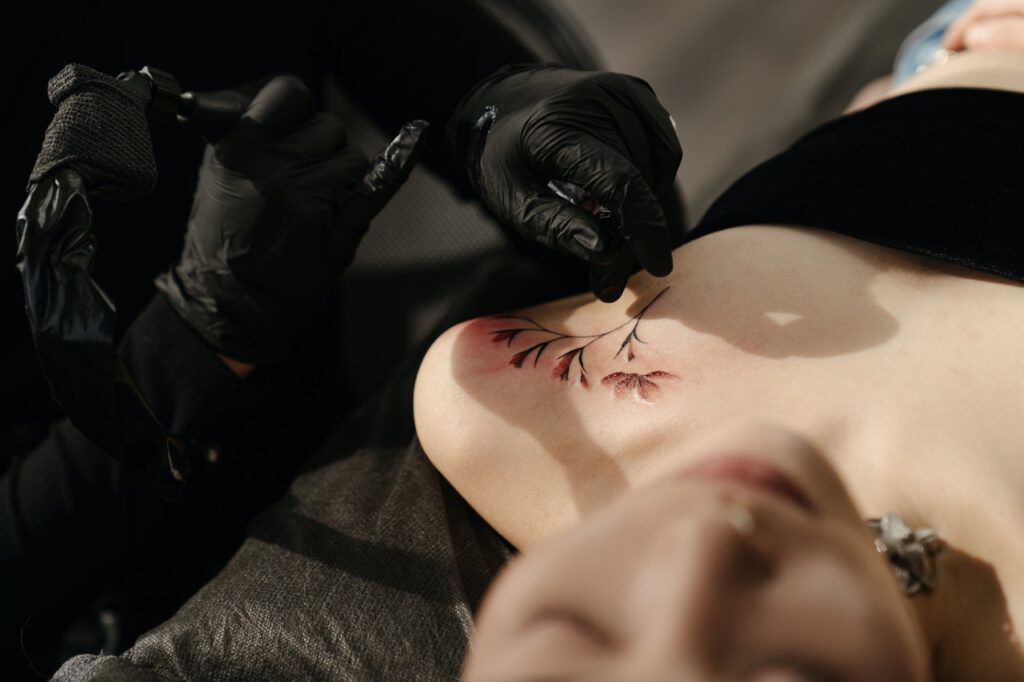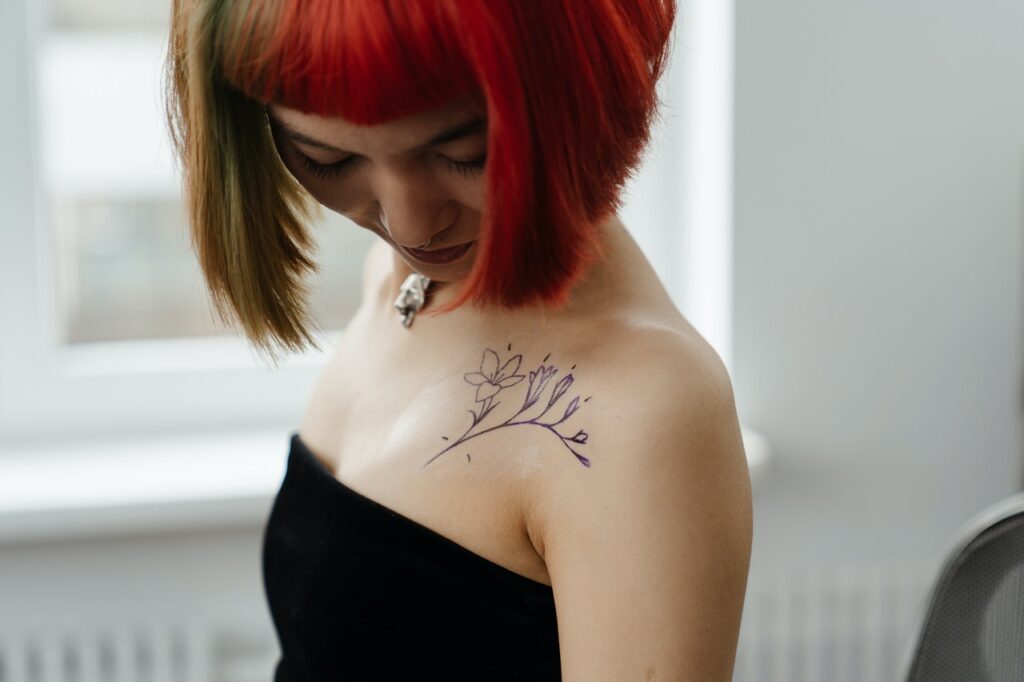If you recently got a tattoo, then firstly; congratulations! It’s a bold, brave decision but one which the majority find richly rewarding. In fact, in a 2021 study, it was revealed that just over one in ten people in the United States who had been tattooed regretted the decision, with 88% happy with their choice. How do you like those odds?
Tattoos are a great way to express yourself and show off your personality, sure, but in the wrong hands (on the wrong arms…), they may reveal a careless side if you don’t look after them properly in those first few days and weeks. This is because fresh tattoos require strict after-care to ensure they not only look their best for years to come, but that you avoid infection, too.
With all of that in mind, here are 6 aftercare tips to follow after getting a tattoo.
Keep Your Tattoo Clean And Dry – Don’t Let It Get Wet Until It’s Healed
As soon as you’re done getting inked, your artist will probably clean your tattoo with some green soap, which helps sanitise and clean the skin. After that, they’ll apply a thin layer of ointment (usually petroleum jelly) before wrapping it up in cling film, then a bandage. This is all done to protect your tattoo, which is essentially an open wound at this stage, from the elements.
Generally, you should remove the bandage 24 hours later, though consult with your tattoo artist prior for the exact timeframe, as this can sometimes differ according to the size of your tattoo and several other factors. At this stage, you should gently wash the tattoo with antimicrobial soap (avoid using any scented soaps during this period, instead opting for fragrance-free, hypoallergenic soap and moisturiser) before patting dry. Next, apply some antibacterial ointment, which your tattoo artist will have given you.
Repeat this step twice a day, for around four weeks, making sure you dry your tattoo thoroughly after each wash. You should also wait four weeks before swimming with a new tattoo, soaking in the tub, or getting sweaty at the gym. If your tattoo gets wet, pat it dry with a clean towel and put more ointment on. Doing this will help your tattoo heal quickly and prevent infection.
And though it’s important to keep your tattoo dry, it’s equally essential to keep yourself hydrated, which ensures the skin stays supple.
Don’t Scratch Or Pick At Your Tattoo – This Could Cause Infection
It’s important to let your tattoo heal naturally. Once it’s healed, you can enjoy scratching and picking at it all you want! Actually, don’t do that. Or, do; just make sure to wash your hands first. Anyway…
If you scratch or pick at your tattoo while it’s healing, you could cause an infection. The last thing you want is for your beautiful new tattoo to get all gross and infected. It rather ruins the majesty and mystique of a tattoo if it’s weeping, don’t you think? So, this tip is simple; don’t touch your tattoo, unless you’re cleaning and drying it.
Avoid Exposing Your Tattoo To The Sun Or Sunbeds Until It’s Healed
If your tattoo is still healing, it’s important to keep it out of the sun. Not only will this help your tattoo heal faster, but it will also help prevent fading and discoloration.
If you must be in the sun, make sure to cover up your new ink with specialist tattoo sunscreen of at least SPF 30, or a bandage or clothing. Once your tattoo is healed, you can enjoy the sun without worry (except, of course, the usual risks inherent with sun exposure).
Once again, remember that even if your tattoo is healed and ready to be shown off to the world, it’s still important to use sunscreen to protect it from fading. Every responsible person with a tattoo artist certification would suggest you use sunscreen with at least SPF 30 on your tattoo once it has healed. This will help to protect it from the sun’s UV rays and keep your tattoo looking as vibrant for as long as possible.

If You Have A Reaction To The Tattoo Ink, Seek Medical Attention Right Away
If you experience any type of reaction to the tattoo ink (which can happen), it is important to seek medical attention right away. Some allergic reactions can be mild, while others can be more severe and even, in very rare cases, life-threatening. If you have any concerns whatsoever, be sure to contact a doctor or go to the emergency room. Check out Healthline’s useful tips on how to identify an allergic reaction to tattoo ink here.
It’s also important to note that, in some cases, people may not have an allergic reaction to the ink itself, but to one of the other ingredients in the tattooing process, such as latex gloves or lubricants. If you experience any type of reaction, be sure to let your tattoo artist know, so they can take appropriate precautions in the future.
Don’t Drink Alcohol For A While
It is also recommended that you should avoid the booze for at least a week after getting a tattoo. Drinking alcohol thins your blood, which may lead to excess bleeding, and prevents your immune system from working properly, which can complicate healing and raise the risk of infection. Also, alcohol will irritate your skin and make the tattoo healing process potentially slower and more painful, so it’s best to just avoid it altogether for a little while post-procedure.

Get A New Tattoo Touched Up By A Professional If You’re Not Happy With The Results
Whilst not exactly an aftercare tip, it’s still worth mentioning; if you’re not happy with the results of your tattoo, getting it touched up by a professional can help improve the appearance of the design.
However, keep in mind that touch-ups may not be covered by your tattoo insurance policy, so be sure to check with your insurer before scheduling an appointment.
Of course, you can return to your original tattoo artist, who will often perform these touch-ups free-of-charge, but there’s no guarantee that you’ll be satisfied with those further amendments, either.
Additional tattoo touch-ups can be expensive, so it’s important to weigh up the cost of the procedure against the overall value of the tattoo. If you’re not happy with the results of your tattoo, but the design is small and not overly visible, you may decide that the cost of a touch-up isn’t worth it. On the other hand, if you’re unhappy with a large or prominently placed tattoo, a touch-up may be worth the investment.
If you do decide to get your tattoo touched up, be sure to find a reputable artist who has experience with tattoo corrections. The touch-up process can be delicate, so it’s important to entrust the job to a professional who knows what they’re doing.
Finally, if, heaven forbid, you don’t fall in love with your tattoo as much as you hoped, the guys at Removery, who specialise in tattoo removal in Sydney, offer these reassuring words; ” Tattoos can show individuality or culture, but sometimes we find ourselves no longer in love with the ink that we have. That is where tattoo removal comes in.”
And with our tattoo article (and journey from after care to removal!) coming to an end, we’re off to the tattooist for another ink!
The Bottom Line
In the end, getting a tattoo is a major life decision. Always consult with your doctor beforehand to make sure it’s safe for you to have the procedure, and once you get your tattoo, be sure to follow the appropriate aftercare to both avoid infection and give your tattoo longevity.





